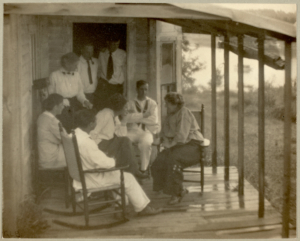Shareable Treasures
There is no better gift than a story
I used to think about the longevity of gifts. What could be given that would be cherished for more than a handful of days or a couple of weeks?

A pie is a safe gift, but, in my experience as a recipient, even a mediocre one doesn’t last more than a few minutes. A birdhouse is nice, too, but let one hungry snake crawl up inside it, and the carefully painted blocks of wood you spent the better part of a week on are probably going to be taken off the back fence post before the sun sets on the day. I thought about my own lived experience to uncover my answer, and, finally, after I had a few years of teaching behind me, I figured it out: stories. Stories do not fade.
The answer shouldn’t have been difficult for me to arrive at because some of my most cherished childhood memories are from the story-filled nights I was gifted on my grandparents’ cramped porch.
You see, I grew up on a cattle farm in a small, rural town that had a country store, no traffic lights, and a lot more cows than people. My family’s house sat off the winding paved road and down a rutted dirt one. Most of my relatives lived within a few hundred yards of one another.
In terms of entertainment, I thought — back then — that my options were pretty limited. There were cousins to chase and ducks to chase me. Late in the evenings, though, when my mother would often take me and my younger brother to our grandparents’ small house, the magic would come. And not by gathering around a television or anything like that. Instead, my family would sit together on the back porch, surrounded by the warm glow of lightning bugs dancing in the silhouetted trees, and we’d tell stories. My grandmother would laugh. My grandfather would howl. We would listen for hours — and hope no one would admit they were getting sleepy.
The thing about my relationship with stories, though, is that they aren’t just gifts I received during my youth and still appreciate today. Our bond was bigger than that. More important. I saw the value in them; I wanted to figure out a way I could give them to others. So I became a writer, and, I think more importantly, I also became a teacher.

Many teachers likely can relate to what I’m about to say here: As an instructor of creative writing and drama at Loretto High School in Lawrence County, I (on most days) feel like the world’s greatest gift giver. I get to share stories constantly — by assigning them for reading, of course, but also by giving my students the power to tell their own. When you ask students to write a story, a poem, or an essay, you’re not assigning a stringless task. You’re asking those students to share themselves — to be vulnerable, to be free, to be authentic. In an education system that relies so heavily on mandates and testing, allowing students the agency to write freely — and creatively — is, frankly, one of the greatest gifts they can receive. I’ve experienced this, and I’m told this, too.
In fact, students frequently tell me how important stories are to them and how thankful they are to have encountered them. But they also show me through their enthusiastic involvement with storytelling. Many of my creative writing students, for example, regularly participate in Humanities Tennessee’s Young Writers’ Workshop, which is held annually during the summer and brings together some of the most dedicated young creative writers throughout the state. (I’ll be teaching there this summer.) My students also created a literary magazine, which they named The Golden Typewriter. They win competitions, apply to workshops, and many of them have desires to continue writing and publishing after they leave the classroom.
I also get to share stories with my drama students. Since 2020 and the dawning of the pandemic era, our productions have been small in scale, but they’ve still been full of heart — and love, really. A Night at the Theatre, an annual production for our department, is a show built around students performing skits and monologues that they write and develop during the first few weeks of our class. They tell their stories, and then they perform them for a full house to enjoy.
Whether bringing to life stories involving kazoos, job-seeking corpses, or pasta-filled crimes, I watch as these dedicated young artists cry and laugh. I see them fall deep into worlds they have so lovingly created. I witness how they lose themselves temporarily and become someone else — a person they know because they allowed the stories to exist inside them.
I regularly hear from many of my past students who ask me if I remember a certain story they wrote or a skit they performed. I smile and nod, assuring them that, like them, I don’t easily forget much of anything when it comes to our creative writing and drama classes.
That’s the thing with these gifts we call stories. We cherish them, and even as the days, weeks, months, and years pass, we hold them tight.

Copyright © 2022 by Bradley Sides. All rights reserved. Bradley Sides is the author of a collection of short stories, Those Fantastic Lives. On most days, he can be found teaching creative writing and English in southern Tennessee.


